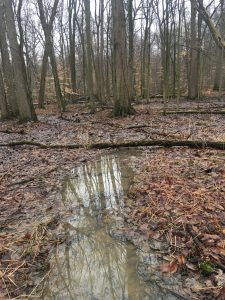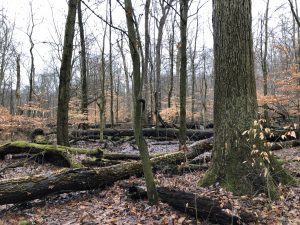
The very reason Johnson Woods still stands is because of its less than ideal terrain. The low-lying area’s susceptibility to water collection made it a poor lumber candidate. The oaks that stood there before the Pilgrims were spared by sheer luck. And so, the trees were allowed to grow, more from a lack of human interest than a genuine connection to nature. Humans tend to ruin things they come across, and this collective of oaks, beech, maple, and hickory remained pristine because its swampy character was not seen as pristine enough to humans. But is it untouched anymore? The boardwalk slices through the ancient groves, a constant reminder of human presence. Yes, it limits most human activity to the boardwalk and thus protects the fauna and flora away from it. However, with the boardwalk came bench arsonists, more graffiti, and constant disruption of visitors. While many visitors rever the trees, there are unfortunately always bad apples. Yet, one can not witness nature if they are not there at all, but with increased involvement in nature comes more foot traffic. My father argues a house is considered nature just as much as a bird’s nest. I suppose I am too romantic to immediately agree, growing up to see nature as some god-like other, an escape to serenity. But when humans further evolved, they did not simply book a ticket to civilization and wave nature goodbye. It did not go anywhere and we still exist within it even though we rever the image of nature before humanity. The more untouched the better, it seems. It is up to us now to defend nature from ourselves before we outgrow our welcome once more.

